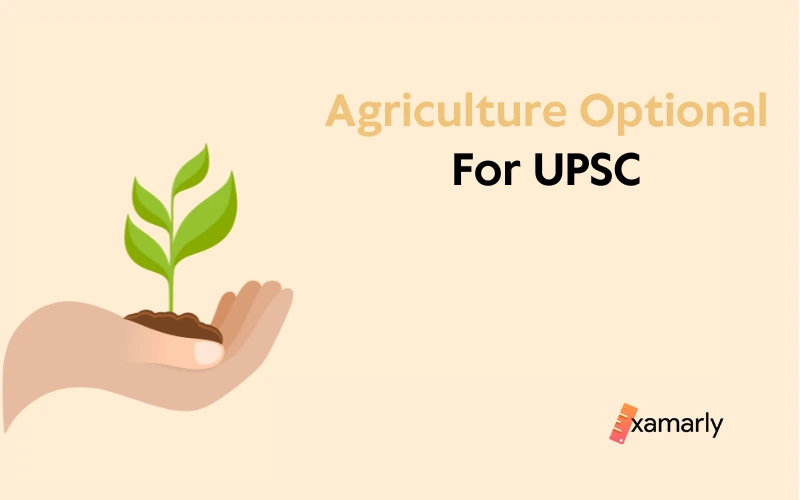Agriculture optional for UPSC is one of the most popular electives among candidates due to its extensive applicability for the exam. It treads on discourses on food consumption patterns and Indian farm practices of recent times. This subject matter is not entirely static or not entirely dynamic. It is theoretical mostly yet extends the practical application of the theoretical parts. This is the reason why topics related to this subject have so much overlap with GS papers. India prides itself on its agro-based economy. Therefore, a prospective diplomat taking up Agriculture as Optional in UPSC Civil Services Mains Exam has a way to go.
The optional Agriculture Paper has many technicalities and promises good results. To reap maximum benefits from the subject, you should understand the books, syllabus, and important pointers to strategize your preparation.
- How Is Agriculture Optional For UPSC?
- How Many Opt For Agriculture In UPSC?
- Why Choose Agriculture Optional?
- Agriculture Optional Syllabus For UPSC
- Tips To Prepare For UPSC Agriculture Optional
- Is It Essential To Make Agriculture Optional UPSC Notes?
- Books For Agriculture Optional
- Conclusion
- FAQs
- Is Agriculture A Good Optional For UPSC?
- What Has Got UPSC agriculture optional highest marks so far?
- Who Ought To Choose Agriculture?
- Why Should One Not Opt For ‘Botany' Instead?
- Is It Possible To Switch Optional From Botany To Agriculture?
- Is Agriculture As Optional Subject In UPSC Scoring?
- How Much Time Is Required For UPSC Agriculture Optional Preparation?
How Is Agriculture Optional For UPSC?
The UPSC optional is currently playing a significant role in both making the selection list and narrowly missing it. Recurrent selections of candidates from Agriculture optional suggests that this subject has much relevance to the Indian economy. Any Candidates, who will prepare this subject strategically, tend to receive at least 250+ marks in the optional paper. Because of the technicality of this subject, the questions asked in the UPSC exam tend to repeat several times. With appropriate instruction and extensive writing practices, one can master the concepts of agriculture and achieve above 300 marks in this optional paper.
How Many Opt For Agriculture In UPSC?
The agriculture optional syllabus is not as long as the syllabi of other optional subjects, and you can manage it well in the limited time frame. Paper II of Agriculture optional is very similar to Paper II of Botany, and you can prepare both of them at the same time. Also, this subject is practical and concept-driven in nature, which benefits students who have a slightly analytical mind.
UPSC Agriculture Optional Toppers
The below table shows the list of toppers having agriculture optional in different years:
| Name | Year | Rank |
| Amit Shinde | 2017 | 705 |
| Vikrant More | 2017 | 430 |
| Yatish V. Deshmukh | 2017 | 159 |
| Pallavi Sarkar | 2016 | 293 |
| Anoop Shetty | 2012 | 140 |
| Preeti Maithil | 2008 | 92 |
The Success Rate Of Agriculture Optional In UPSC
The following table presents the success rate of candidates who opt for Agriculture optional. From the table, we can see a double-digit success rate of Agriculture optional in most years.
| Year | No. of candidates appeared | No. of candidates cleared |
| 2017 | 89 | 11 |
| 2016 | 220 | 41 |
| 2015 | 86 | 11 |
| 2014 | 65 | 7 |
| 2013 | 77 | 7 |
| 2012 | 122 | 20 |
| 2011 | 132 | 16 |
| 2010 | 205 | 3 |
| 2009 | 180 | 19 |
| 2008 | 220 | 41 |
| 2007 | 226 | 15 |
| 2006 | 180 | 19 |
| 2005 | 157 | 25 |
Why Choose Agriculture Optional?
For Agriculture Graduates
- Agriculture has a relatively shorter syllabus and you can cover the entire syllabus in a reasonable time frame compared to other optional.
- As an agriculture graduate, you are aware of almost every topic in this subject.
- You will face less difficulty while doing questions in the exam hall, as most of the questions are recurrent.
- Even while tackling extraordinary questions, your knowledge base will help to extract some points regarding it. For example, you can comment on the Targeted Public Distribution system by analyzing trends in poverty, water stress, and other ecological factors and, current affairs related to market intelligence, price fluctuations, etc.
- You can also conduct a socio-economic survey and come up with advance tools for optimum resource management of natural resources and human resources such as agricultural labourers in practices for production.
- Likewise, you can also suggest strategies for development by proposing various training programmes for extension workers and marginal farmers. Bring innovation to your answers by conjoining the economic with the scientific.
- Agriculture graduate can use their field experience and knowledge in especially Agricultural extension-related topics.
- The use of figures/diagrams instead of long paragraphs will always help to score better.
For Non-Agriculture Graduates
- Paper II of agriculture has a lot of sync with botany. So, candidates with plant science backgrounds, graduates in biotech, chemistry, botany, etc. can also opt for Agriculture optional.
- The Agriculture optional boasts of a high success rate among all the optionals, which makes it the best choice for non-Agriculture academic background candidates also.
- Many topics in agriculture overlap with the general studies papers, especially in economy and geography, (such as cell structure, cell cycle, History of plant breeding, principles of plant breeding, significance in recombination breeding, genetic material, chromosomal aberrations, Chromosome structure, crossing techniques, Diagnosis of pests, DNA fingerprinting, fertiliser recommendations, Losses of nitrogen, Molecular markers, organic constituents, tech horticulture, aromatic plants and Essential plant nutrients), it will be like preparing for both exams simultaneously.
- Farmers and other food distress had always been hot topics for “Newspaper”, this can help anyone with essay papers with sound research-oriented answers.
- Do not just rely on study materials given by coaching institutes. Start your own preparation today. There is a lot of reading material available on the Internet or any educational platform, like – Examarly, to prepare better for even non-agriculture background candidates. Track your own progress, and compare it with peers from the same optional background.
- There have been at least 20% of questions from Agriculture Optional in partial overlap with GS-3 paper, in recent years. This helps students to prepare both papers simultaneously. Also, due to the current focus on Food Production & Nutrition Management, questions from this field become crucial.
- Unlike humanity subjects, this subject requires answers which were not based upon interpretation. Thus, losing the marks on the basis of the answer given by you does not match with that of the examiner.
Agriculture Optional Syllabus For UPSC
The UPSC Mains exam format includes 2 optional papers. Each paper has a maximum of 250 points, for a total of 500 optional points.
The first Paper contains some Important features and scope of various types of forestry plantations such as agro-forestry, social forestry, natural forests, forest products, propagation of forest plants, Agro-forestry, and value addition. Conservation of forest flora and fauna, genetic engineering, sectors in seed production, Seed certification, seed registration, Physiology of seed development and seed testing in Indian Agriculture also become important.
Paper II has covered some basic concepts of Plant Physiology with reference to plant nutrition, absorption, Water-use efficiency, translocation and metabolism of nutrients, Soil-water-plant relationship, nitrogen fixation and modern concepts such as processing technologies, Agricultural technologies, Post-harvest technology and nitrogen-use efficiency.
To learn about the Agriculture Optional Syllabus For UPSC, visit the linked article.
Tips To Prepare For UPSC Agriculture Optional
- Familiarise yourself with the entire syllabus and exam pattern. Trends of questions will be understood only when one goes through the prior year’s question papers.
- Focus more on answer writing. Try to do an interdisciplinary study of economics, Geography, Agriculture, Plant Sciences, Rural Development, Agricultural Economy, and Animal sciences to prepare a more intellectually informed answer.
- Practice lots of diagrams and flowcharts, because they make your answer visually appealing and a lot more precise and convenient. This will help you to brush up on your practical knowledge.
- Reread your notes. Cut down the extra burden from your coaching materials. The ultimate aim is to make your notes short and crisp so that daily revision becomes easier and less time-consuming. Build your very own study material.
- One of the most effective strategies to prepare for the UPSC agriculture optional is to solve the previous year’s questions on agriculture. This will help in boosting your answer writing skills and increase the chance of getting good marks.
- Moreover, you should try to write your answer in an innovative manner to fulfill the demand of questions. This way, you will be able to catch the attention of the examiners and gain higher marks.
- Try to write your answers using headings and quotations. It will help you in boosting your writing speed and improve your subject knowledge.
- Candidates should be aware of international conventions and the current trends of government data on agriculture-related statistics published on the agriculture ministry and Krishi Vigyan Kendra’s websites.
- Besides these, you should also focus on the economic and sustainability aspects of agriculture. To do this, you can practice questions from prior years as well as solve mock tests of these papers to improve your knowledge.
Is It Essential To Make Agriculture Optional UPSC Notes?
If you want to simplify your preparation, it’s crucial to make your own UPSC agriculture optional notes. UPSC Mains syllabus is so lengthy, and because of this, it is very difficult to remember everything and impossible to go through the entire syllabus while revising. The notes will save your ample time in revision and help you to remember important topics.
Even if you are unable to take notes on every topic, ensure to do so for at least five of the optional topics.
- Physiology: Geographic Information Systems, tools for ecosystem analysis
- Science of soil: Systems of Farming, Types of farming systems, farm planning
- Breeding: high-yielding and short-duration varieties
- Genetics: Laws of heredity, Genetic engineering, application in plant improvement
- Agronomy: Agricultural price policy, International food policies, policy implementation in national level and worldwide, Food grain productivity, distribution constraints, Processing constraints, Reasons for grain surplus, commercial floriculture, expenditure on food
Books For Agriculture Optional
- Fundamentals of Plant Physiology – V.K. Jain
- Fundamentals of Genetics – B.D. Singh
- Plant Breeding Principles and Methods – B.D. Singh
- Plant pathology – PD Sharma
- Introduction to Horticulture– N. Kumar
- Principles of Agronomy – Reddy & Reddy
- Introductory Soil Science by DK Das
- Plant Physiology by Sinha & Pandey
- Introduction to Agriculture by AK Vyas
- Economics of Farm Production and Management by VT Raju & DVS Rao
- Essentials of Plant Breeding by Phundan Singh
Conclusion
Agriculture is a very scoring optional subject in UPSC exams. A candidate with a strong interest in the subject should opt for this. However, any other candidates with Zoology, Botany, and related fields as their graduation or post-graduation subject may also find it appropriate to choose because this subject has a short syllabus, making it possible for a student to complete the syllabus in 4-5 months and it’s related to other streams, making it appealing to students who may not have any previous knowledge about the subject.
It is a technical subject like any other science subject. So with the correct strategy, it is easy to score well in this subject. In addition, it has a lot of figures, graphs, tables, and drawings that if you use them properly, your chances of getting selected will increase.
FAQs
Is Agriculture A Good Optional For UPSC?
If you have a familiarity with subject, it is an appropriate optional choice for you. However, due to the short well-defined and manageable syllabus, non-agriculture backgrounds can also choose this subject. This subject has much overlap with GS paper 3, which makes it easier for candidates to prepare in a limited period of time. Also, its high success rate in recent years enables it to draw the attention of many candidates. Overall Agriculture optional can harvest major fruits for any candidates who have a genuine interest in Plant Sciences and are well versed with diagrams and figures.
What Has Got UPSC agriculture optional highest marks so far?
Preeti Maithil in 2008 acquired AIR-92 with UPSC Agriculture optional.
Who Ought To Choose Agriculture?
Candidates with a graduate in agriculture, botany, life sciences, biomedical sciences, zoology, biotechnology, dairy, or related field, can opt for Agriculture optional as they will have a depth of knowledge in this domain.
Why Should One Not Opt For ‘Botany’ Instead?
Botany is undoubtedly a good choice if it is your graduation or master’s course, but agriculture is a better alternative if you don’t have any interest in just indulging in theory. Agriculture combines both theory and practice.
Is It Possible To Switch Optional From Botany To Agriculture?
Yes, one can change their optional. If you found Botany exhausting, you can change it to Agriculture. In fact, it will give you an extra edge if you read botany partially or fully.
Is Agriculture As Optional Subject In UPSC Scoring?
The Agriculture optional subject for UPSC has a high scoring rate among all other optionals. Just some extra practice and being well-versed in diagrams will yield beneficial elements to your total score in UPSC IAS Mains.
How Much Time Is Required For UPSC Agriculture Optional Preparation?
Agriculture has a comparatively short syllabus. The completion of syllabus requires 4 to 5 months if studied properly and consistently.






